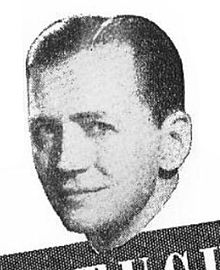Tommy Tucker | |
|---|---|
 | |
| Background information | |
| Birth name | Gerald L. Duppler |
| Born | May 18, 1903 Souris, North Dakota, United States |
| Died | July 11, 1989 (aged 86) Sarasota, Florida, U.S. |
| Genres | Big band, jazz |
| Occupation(s) | Bandleader, music professor |
| Instrument(s) | Piano, accordion, trombone |
Gerald L. Duppler (May 18, 1903 – July 11, 1989), better known under his stage name Tommy Tucker, was an American bandleader.
The Tommy Tucker Orchestra entertained many listeners as a big band in the 1930s and 1940s. Popular as a dance band, the Tucker orchestra played concert halls, theatres, hotels and various venues across the country—for a span of 25 years. Recorded for Okeh in June 1941, his biggest hit, "I Don't Want to Set the World on Fire", achieved status as a Gold Record. Tucker wrote his own theme song, "I Love You (Oh, How I Love You)"; it was published on four record labels, including Brunswick, in 1935, and MGM in 1951.[1]
Many listeners were familiar with the Tucker orchestra sound because they tuned into popular radio shows, such as Fibber McGee & Molly in 1936 and the George Jessel show in 1938, and several shows billed as Tommy Tucker Time.[2] In 1941, Tucker led the orchestra for a New York City version of the Pot o' Gold radio program, which was simulcast on three stations.[3] Tucker opened each performance—on radio or live—with his signature "tic-toc, tic-toc, it's Tommy Tucker time." And he usually ended each session with Time to Go.[4]
- ^ Christopher Popa. http://www.bigbandlibrary.com/tommytucker.html
- ^ Wayne Knight from Liner notes to the disk Tommy Tucker Orchestra, It's Tommy Tucker Time, produced by Collector's Choice, Itasca, Ill.
- ^ "'Pot o' Gold' Program For New York Is Begun" (PDF). Broadcasting. January 13, 1941. p. 32. Retrieved 15 April 2016.
- ^ Trudy Tucker Thomson, daughter, Chapel Hill, NC